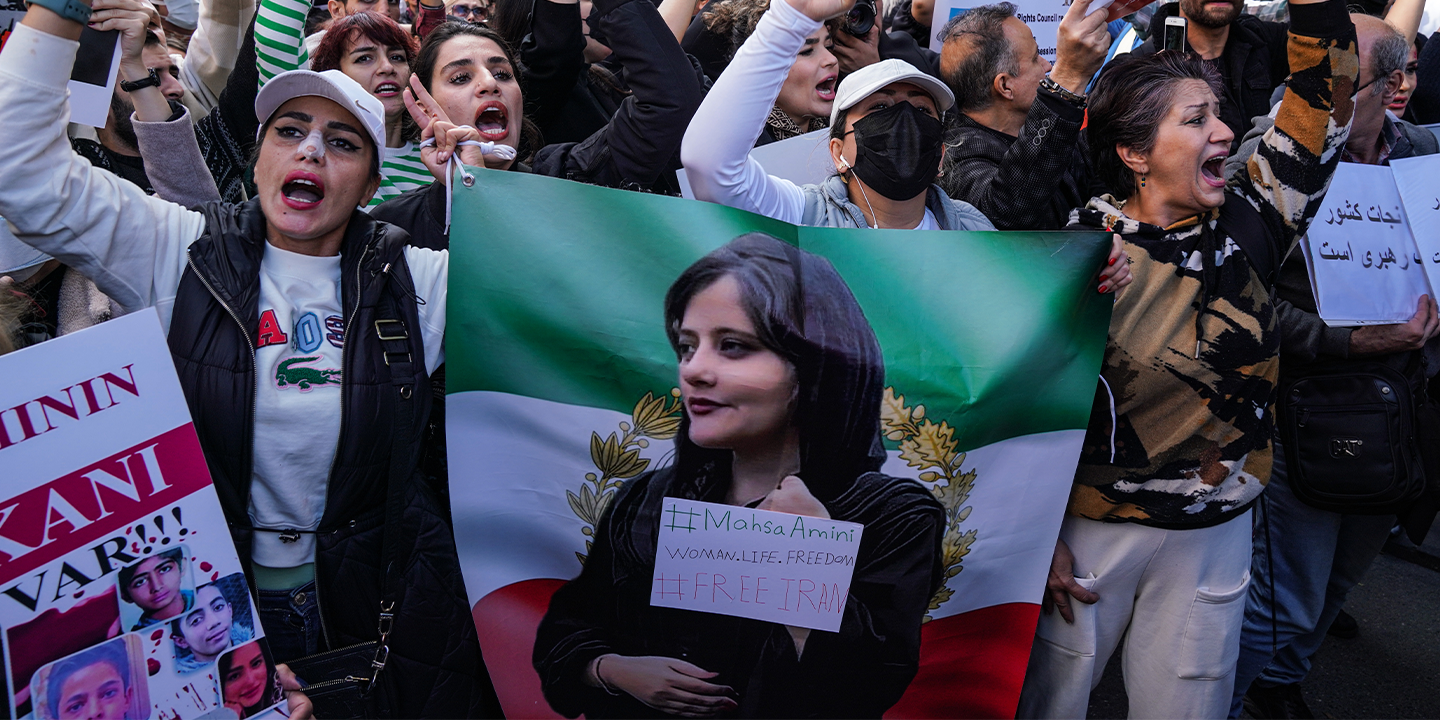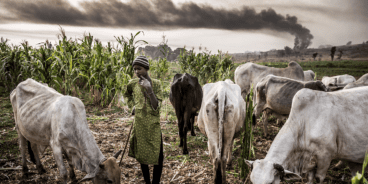

Atrocity Alert No. 322: Iran, Ethiopia and Sudan/South Sudan
Atrocity Alert is a weekly publication by the Global Centre for the Responsibility to Protect highlighting situations where populations are at risk of, or are enduring, mass atrocity crimes.
IRANIAN SECURITY FORCES USE EXCESSIVE AND LETHAL FORCE AGAINST PROTESTERS
Over the past month thousands of demonstrators and human rights defenders have taken to the streets in cities across Iran and faced a violent crackdown by Iranian security forces. In recent days the security forces have intensified their crackdown, utilizing unnecessary and disproportionate force, including with live ammunition and metal pellets. Over 200 people have reportedly been killed, including at least 23 children, and hundreds injured to date. Since 18 September more than 1,000 protesters, human rights defenders, civil society activists, journalists, university students and school children have also been arbitrarily arrested and detained. The actual casualty and detention figures are likely significantly higher.
The protests erupted after the death of 22-year-old Mahsa Amini, who was arrested by the so-called morality police on 13 September for allegedly wearing an “improper hijab” in violation of Iran’s strict requirements on women’s dress. Ms. Amini was reportedly severely beaten by the morality police and subsequently fell into a coma at the Vozara Detention Centre before her death in a hospital on 16 September. Iranian authorities claim that she died of a heart attack from natural causes, however, other reports suggest that her death was due to alleged torture and ill-treatment. Since then, protests have continued, with the focus of the demonstrations expanding beyond accountability for Ms. Amini’s death to broader grievances, including demands for fundamental political and social change, as well as the protection and fulfillment of all human rights.
Iranian authorities have disrupted internet access in large parts of the country, making it challenging to determine the actual number of casualties, arrests and detentions. On 22 September a group of UN human rights experts warned that “disruptions to the internet are usually part of a larger effort to stifle the free expression and association of the Iranian population, and to curtail ongoing protests. State mandated internet disruptions cannot be justified under any circumstances.” This is the third widespread internet shutdown recorded over the last year in Iran.
Further escalation and violence perpetrated by Iranian security forces against civil society, human rights defenders and peaceful protesters would present a serious risk of atrocity crimes. Iranian authorities have a history of violently cracking down on peaceful protests with impunity. In November 2019 at least 106 people were killed and over 1,000 arrested as security forces confronted nation-wide protests over increasing fuel costs.
The UN Human Rights Council should urgently convene a special session on the serious human rights violations and escalating risk of atrocities in Iran. Due to ongoing systematic impunity and the lack of domestic avenues for accountability, UN member states should work towards the establishment of an independent investigative and accountability mechanism that complements the mandate of the UN Special Rapporteur on the situation of human rights in Iran.
FEARS FOR CIVILIANS GROW AS CONFLICT REIGNITES IN ETHIOPIA’S TIGRAY REGION
On 17 October Ethiopian federal forces captured the strategic city of Shire in the North Western Zone of the Tigray region, prompting thousands of people to flee in fear of a recurrence of atrocities. Shire – one of Tigray’s largest cities – had become a hub for those displaced in the nearly two-year-long civil war between Ethiopian federal forces, and their Eritrean and other allies, and forces loyal to the Tigray People’s Liberation Front. That same day the Ethiopian government announced that it intends to retake all airports and federal facilities in Tigray, further escalating concerns of a return to widespread conflict.
The UN High Commissioner for Human Rights, Volker Türk, stressed that, “the toll on civilians is utterly staggering.” Populations in Shire and other Tigrayan cities are enduring heavy, indiscriminate bombing, which is hitting residential areas, killing civilians, damaging critical infrastructure and restricting access to essential services.
When a five-month-long humanitarian truce broke down on 24 August, the UN Human Rights Council-mandated International Commission of Human Rights Experts on Ethiopia had warned that the resumption of hostilities would place civilians at risk of further atrocities. Dozens of civilians have already been killed by air and drone strikes on Tigrayan cities in the past month, including at least 50 people sheltering at a displacement site at a school in Adi Daero on 4 October. An aid worker and two others were also killed while delivering humanitarian assistance to women and children in Shire on 15 October.
According to the Director-General of the World Health Organization, Dr. Tedros Adhanom Ghebreyesus, Ethiopian and Eritrean forces have been carpet-bombing cities in Tigray “almost daily,” killing civilians and gravely wounding others. Some of those wounded in airstrikes have died due, in part, to a blockade of humanitarian aid to the region, which has restricted access to life-saving medical equipment. The UN Secretary-General stated that sexual violence and “other acts of brutality” against women, children and men have also been reported.
Despite the announcement on 6 October that both sides to the conflict had agreed to meet for African Union (AU) led peace talks, the talks were indefinitely postponed. Ethiopia Expert at the Global Centre for the Responsibility to Protect, Sarah Hunter, said, “civilians in Tigray, who have endured almost two years of conflict, atrocities and a dire humanitarian crisis, are at grave risk as fighting escalates again. All parties to the conflict and the AU must hold the peace talks as soon as possible to end the fighting once and for all.”
INTER-COMMUNAL VIOLENCE RESUMES IN ABYEI
Renewed violence in the Abyei Administrative Area – a disputed border region between Sudan and South Sudan – has resulted in at least 25 people killed. On 10 October armed youths from the Twic Dinka community in Warrap State, South Sudan, attacked youths of the Ngok Dinka from Abyei. Both sides claim the other is encroaching on their land. Deng Ajak, a local administration official, said that, “the situation is worrisome… It is very tense. There is too much hatred between these two sisterly communities,” and further warned that the violence may escalate if the disagreement over where the borderline separating the communities lies goes unresolved.
Tensions between the Ngok Dinka and Twic Dinka communities first escalated with clashes in February 2022. Although there was a lull in fighting between June and August, violent clashes erupted again in late September in Agok, an Abyei border town. On 14 October the UN Mission in South Sudan expressed its grave concern about the surge of violence since February, stating that, “the clashes have resulted in the loss of many lives, injuries to scores of people, the burning down of homes and properties, and the mass displacement of thousands of civilians on both sides.”
The conflict between communities in the Abyei region is deeply rooted in grievances over land borders and resource allocation. The region – consisting of farmland, desert and oil fields – is claimed by both Sudan and South Sudan and, as a result, has ill-defined borders. Abyei is traditionally the homeland of the Ngok Dinka community, which has strong ties to the Dinka in South Sudan. For decades, communities in the region have competed over resources, sparking cycles of violence that have also been exacerbated by climate change and severe droughts.
As the situation in Abyei remains volatile, the governments of Sudan and South Sudan must lend their political support to the UN Interim Security Force for Abyei and call for the immediate cessation of violence. Communities in Abyei should encourage traditional leaders to reconvene the joint peace conference and hold effective and inclusive talks to settle disputes concerning the shared use of resources. The African Union should intensify its mediation efforts, including through encouraging the resumption of meetings by the Abyei Joint Oversight Committee to find sustainable solutions to the conflict.
Related Content


Atrocity Alert No. 444: Nigeria, Haiti and South Sudan
